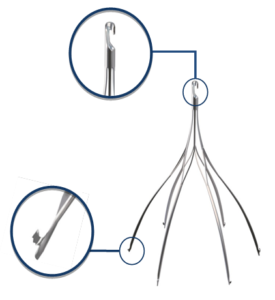The lawsuit was filed by Jesse K., a man from Wisconsin who was implanted with the Option™ ELITE Retrievable Inferior Vena Cava Filter (“IVC Filter”) on December 7, 2015 at Luther Hospital in Eau Claire, Wisconsin.

Option™ ELITE Retrievable Inferior Vena Cava Filter
The filter was implanted for prophylactic purposes after he was in a motor vehicle accident. He did not have any blood clots at the time.
IVC filters catch blood clots in a major vein called the inferior vena cava (IVC), which carries “used” blood from the body to the lungs. This helps prevent pulmonary embolisms in people who are at risk.
The Option is advertised as a retrievable filter that should be removed when it is no longer needed. However, it developed several major complications that made it impossible to remove within only 4 months.
On March 25, 2016, he underwent a procedure to remove the filter. The filter could not be removed because it was tilted and the retrieval hook was embedded in the wall of the inferior vena cava.
On May 6, 2016, another doctor attempted to retrieve the filter using the “hangman” technique, which creases a wire loop between the filter neck and the wall of the vein to pull out an embedded filter hook.
The doctor could not snare the hook and the filter could not be retrieved because it was embedded, so the procedure was stopped.
The doctor noted that a leg of the filter was bent perpendicular. If it broke off during a retrieval attempt, or afterward, it could travel in his bloodstream like a missile to the heart and cause sudden death.
Things only got worse when he had a CT scan on June 1, 2016. The CT scan showed that the filter hook was no longer just embedded, it had actually punctured through the vein so far that it nearly hit his kidney.
According to the lawsuit:
[CT scan] showed that the nose of the filter is extending significantly outside the lumen of the vein. It also showed that the filter is extending horizontally to the right, close to the renal capsula.”
Few doctors would try to retrieve an IVC filter with so many serious problems, but leaving a “retrievable” filter implanted permanently can also lead to major long-term health problems, including blood clots.
Many people falsely believe IVC filters provide permanent protection against blood clots. The reality is that the development of blood clots is the main long-term complication, also known as IVC thrombosis.
These risks may be why the doctor made a third attempt to retrieve the filter. Unfortunately, he was again unsuccessful, despite a complex percutaneous procedure that was performed through the internal jugular and the common femoral vein.
The man now faces a lifetime risk of IVC filter complications, including sudden death, with the chances increasing as long as it is in his body.
Lawyers accuse Rex Medical of failing to adequately test the Option IVC filter for safety before advertising it as a “retrievable” filter.
Rex Medical is also accused of downplaying the Option IVC filter’s high rate of embedment, fracture, migration, excessive tilting, vein perforation, and thrombosis (blood clots) once implanted in the body.
The lawsuit was filed on March 27, 2017 in the Philadelphia County Court of Common Pleas — Case ID: 170302888.
Approximately 3,000 other IVC filter lawsuits have now been filed nationwide against Rex Medical L.P., Argon Medical Devices Inc., Cook Medical, C.R. Bard, B. Braun Medical Inc., and Aesculap.
The plaintiff is represented by attorney Ben C. Martin of The Law Offices of Ben C. Martin in Dallas, Texas; and attorney Stephen A. Sheller of Sheller, P.C., in Philadelphia, Pennsylvania.
 Editor’s note: For more information about IVC Filter lawsuits and your legal rights, please contact The Law Offices of Ben C. Martin.
Editor’s note: For more information about IVC Filter lawsuits and your legal rights, please contact The Law Offices of Ben C. Martin.

